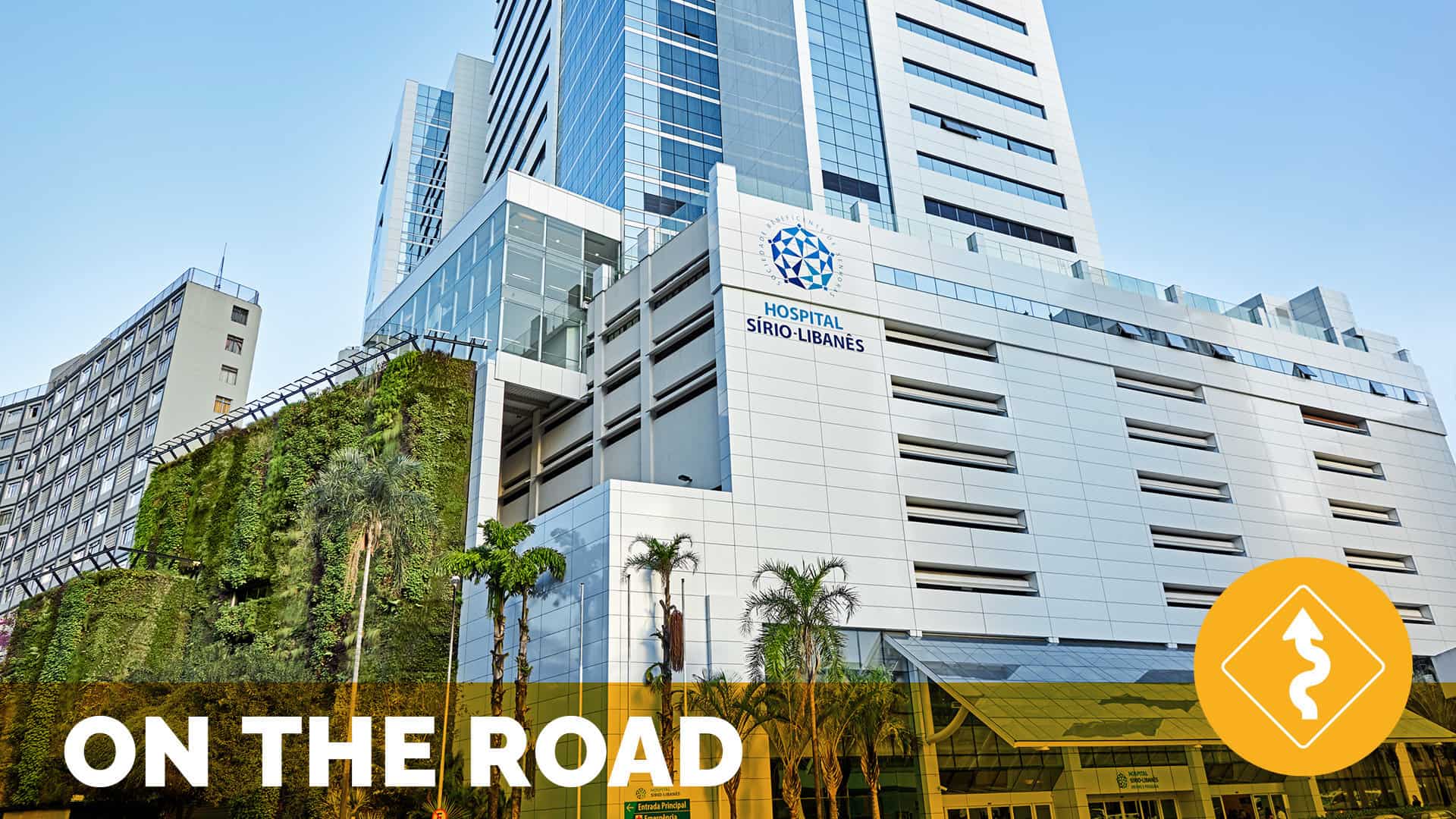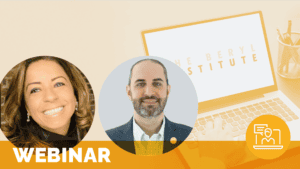A Tribute to Excellence through Human Warmth

On the Road with Hospital Sírio-Libanês – September 2017
by Jason Wolf, PhD
A Foundation of Collaboration
My latest On the Road took me back to the warm and welcoming streets of São Paulo, Brazil and the Hospital Sírio-Libanês, an integrated system with units in both the private and public health sectors and reaching from São Paulo to Brasilia. My visit, while only touching on a few of the places in which Sírio-Libanês offers services, captured the essence of history, excellence, warmth and culture on which the efforts of Sírio-Libanês are built.
My visit to the main hospital and two centers of social responsibility has helped paint a picture of an institution that for almost 100 years has prided itself on being of service to others. As Dr. Paulo Chapchap, CEO, shared with me as we began my visit, Sírio-Libanês does not need to be the leader or best at everything, but rather it aspires to serve as a guide for others. This striving to be an example is grounded in the values on which Sírio-Libanês is built to serve society and make a more just society for all.
In fact, Sírio-Libanês launched its new brand purpose on the last day of my visit (I will share more about the event below), but its words are important in shaping what I experienced over my entire visit: “To Come Together and Share”. This idea of acknowledging the importance of all voices has been central to all we have seen as important in the experience conversation. More importantly the idea of living together acknowledges it takes effort and action to ensure the best in experience. It also reflects the very nature of our own values at The Beryl Institute for as a community of practices based on collaboration, our greatest strength is in our capacity to share, learn and improve as a result.
It is that very commitment that was evident in every interaction I had during my visit to Sírio-Libanês. From the warm welcome from the leadership team to the incredible song sung by the children of the “Embrace your Neighborhood” (Abrace seu Bairro) philanthropic project,and from the pride in which staff talked about their commitment to a positive experience – to quality, safety and service, to the passion with which the teams committed to social responsibility focused on the ability to positively change lives, Sírio-Libanês embodied excellence through human warmth.
Caring for our Patients
The commitment to efforts in any healthcare institution is first and foremost a focus on the best outcomes. In my visit throughout the clinical areas of the facility I was greeted by a recognition that in order to provide the best for patients there was a need to balance the clinical and social realities of healthcare. While I can’t speak to every instance or encounter I can provide a powerful example of this process at work.
On my visit to the Oncology Inpatient area I had the chance to meet an amazing team lead by Adriana Zancheta who spoke of the process in place to ensure excellence in outcomes. She first spoke of quality visits she conducted as a nurse coordinator in which she rounds on patients and family to gather real time data – she inquires if the staff took the time to introduce themselves, wash hands, check wrist bands, were responsive to call lights and other measures. Her intent is to understand and address expectations of patients and underline the critical quality efforts that support overall experience.
In addition to this simple but critical practice the team also introduced me to an important addition to every clinical unit – a concierge. Every unit now has someone from the hospitality team that can address the needs of patients and families that reach beyond the clinical realm. In the case of the oncology unit, the concierge serves as a critical team member and participates in all unit activities. What their presence provide is as Adriana shared “it gives us more time to do what we look to do as nurses and spend more time at the bedside.” This addition of someone to care for the personal needs of patients is unique and powerful, for in investing in caring for the personal needs of patients and families the team at Sírio-Libanês has actually afforded more time to ensure clinical excellence as well.
This focus on clinical excellence was reinforced by a great practice called “Pit Stop”, an interdisciplinary team stand up meeting (shift huddle) that occurs 15 minutes every shift in which the team can come together to review and address the needs of all patients in the unit. It enables issues to be raised and synchronization between team members to ensure a seamless care experience. The addition of pit stops to team’s efforts have helped people not only to address needs, but to get clarity of roles, more efficiency in action and more responsiveness overall. This process underlines the fact that in experience excellence, sometimes it is the simplest of process that can have the most significant of impacts.
What can be done as a result of this was evident in one story the team shared, one patient in palliative care who was close to end of life had a daughter whose fifth birthday was just days away. She feared she would pass on her daughter’s birthday and asked if the team could help to ensure that didn’t occur. Special circumstances were arranged and medication approved to extend her life so they could have her daughter’s birthday party right on the unit. While the mother was comfortably sleeping they were all able to celebrate together, the daughter asking the team if her mother was in pain and they assured her she wasn’t. The mother lived for 48 hours more and the daughter will forever have that memory. In the end, the daughter told the team, “when I grow up, I want to be a nurse”.
While I could cite examples across all the units that so graciously welcomed me from the diagnostic center to pediatric inpatient unit, which had pets visiting the day I was there. From the surgery center to the highly complex and humanized ICU; to the emergency department which was working every day to provide a personalized experience in a complex and chaotic environment, to the rehab center who reinforced a critical role they played was to bring joy and re-instill life in those they cared for, this same commitment to human warmth was evident. In all cases a commitment to process and the person, joy and clinical excellence all balanced in an effort to ensure the best in overall human experience. More so in each of those stops I could feel and see a palpable sense of pride that was clear in not only the work each unit did, but also in the organization they represented.
This level of care was not only present with the clinical staff but in a vital part of the organization woven through each of the steps on my journey, the volunteer staff. These individuals, part of the very history of the institution, represented a powerful presence and a critical role on the team of clinicians, concierge and volunteers. From my visit to the hospital gift shop, which they were clear was not so much a store as it was a place to “meet, greet and listen”, the volunteers share their pride in the interactions they had with others as a face of the hospital and in their capacity as one volunteer offered, “to transform experience”. As some enter this space sad or disheartened, people often leave transformed and enlivened. Quietly, the volunteers had presence in many of the places we walked, from serving as support in the tense environment of the ICU waiting room, to the energized environment on the inpatient pediatric unit as the pet visit was taking place.
These quiet and sometimes unsung heroes of the care experience were clear and present and represented all that was possible in moving Sírio-Libanês to it desired future while grounding it in its rich history. While many organizations engage volunteers in their efforts, the distinction I saw and the opportunity this encounter showed me is that volunteers are not merely helpers for an organization, they are owners of its purpose, its message and its aspiration. We should all learn from what these ladies and gentlemen exemplified as we look to positively impact experience.
Caring for Each Other
The actions of the volunteers represented something else that was evident in my visit to Sírio-Libanês. In taking care of others we must take care of ourselves. This commitment to quality of life and the care and development of people was evident in a number of examples and in the stories and comments many shared. This effort was exemplified in a few great examples. “Caring for Caregivers” (Cuidando de Quem Cuida) program, the Employee House, the Integrative Care program and the broader offerings of the Education and Research Center.
The “Caring for Caregivers” program was a powerful example of by taking care of our own teams we provide better care for others and it follows the concept of Quadruple Aim (Bodenheimer T. and Sinsky C.). There are some dedicated areas of the hospital (ambulatory care) for this internal health service and for the high complexity cases, the caregivers are treated in the same inpatient areas as the patients are. Every employee and their direct family, i.e., spouse or partner and children, have direct access to the care of Sírio-Libanês. Every employee is assigned a primary care physician who serves as their point of contact for care. Employees can schedule appointments through a special phone number and then see their physician. During my brief visit to the unit people were coming for scheduled appointments, bringing their children in for check-ups and walking in for an illness they just discovered. This fully-functional staff-only clinic not only supports the wellness of staff, but their well-being and reinforces the commitment of staff to their work. (For full information and the measurable impact of this work I refer you to a great article from Harvard Business Journal in Brazil on this effort. If you don’t speak Portuguese, you may need google translate once you access: http://hbrbr.uol.com.br/cuidando-de-quem-cuida/.
In addition to this new and expanding service, Sírio-Libanês also offers a wonderful resource called Employee House where staff members can escape for relaxation. Across the street from the hospital, the employee house provides recreational activities such as games and TV rooms, and also provides a full-service salon and even massage therapy. They also provide places to rest and study for those working and going to school. These services for the members of the staff are widely used and seen as a critical part of caring for one another at Sírio-Libanês.
Lastly, the Sírio-Libanês Education and Research Center has rapidly expanded to not only ensure excellence in skills for its own team, but is a leading research center in cancer and other studies as well as a center for educating many in the healthcare profession across Brazil with both in person and distance learning. This commitment to knowledge and learning both for their team and for society underlines the commitment of Sírio-Libanês that in sharing, we all grow. This idea of sharing and a commitment to others is the foundation on which the organization commits it efforts to social responsibility as well.
Caring for Our Community
One of the most powerful and memorable parts of both visits I have now experienced in São Paulo is to see the efforts to support the work of social responsibility and specifically the public private relationships created to ensure the best care for the communities served. As part of my visit I had the chance to visit some philanthropic activities at Peixoto Gomide St. unit, which is part of the Bela Vista neighborhood where Hospital Sírio-Libanês resides. The key to this program is that of health promotion for the lower income families in the neighborhood and meeting special needs for health, education and services. The children here are referred from their local public health centers and are identified for the specific needs they have. From art and sports to music and play, the center as Vania Bezerra offered, “is about more than giving support, to addressing and supporting individual needs.” In seeing these children learn fundamental skills such as team work and collaboration, and gain a stronger sense of responsibility and self-esteem, the program is committed to helping them develop in ways they may otherwise be unable to. The program has helped over 9000 families and their children with health and development and the outcomes were evident. From the tour of the playroom I was given hand-in-hand with the children who designed and decorated it themselves, to the moving song another group prepared and performed for our visit, the impact these services were having was easy to see in the children’s faces. Perhaps more moving was the commitment and pride of the team committed to positively impacting these children’s lives.
On the second day of my visit I was welcomed to the public children’s hospital, Hospital Municipal Infantil Menino Jesus. Without question, perhaps the most moving and inspiring places to see experience efforts in action are in the pediatric space and this was no better exemplified than in this visit to a community public hospital dedicated to caring for children. My visit through the hospital provided a glimpse of people committed to caring for their community and patients and families knowing they are receiving the best care possible. From the opening conversation with leaders in which hospital leader Dr. Madeira shared the incredible satisfaction people have with the hospitals services the focus of this institution was unquestionable. It was about the human experience … and I saw it play out in every interaction. In fact, as Dr. Madeira said, “in this environment, above all others we must focus on experience, on engaging with listening and with respect. We leave no question or complaint unanswered. That is what all people deserve.”
Examples were evident everywhere we walked, such as seeing families as active parts of the care team in the Pediatric ICU (the first in Brazil in which family was allowed to visit 24/7). I offer two specific observations that again reinforce what caring for the human in front of us and how linking quality, safety, service, compassion, empathy and respect all equate the experience we look to provide.
One of our stops took us to the educational center and toy library. Debora Marques who helps lead the center was sharing the role of the center and her job as “to guarantee the right to play … to maintain dignity and childhood in a place sometimes it can seem taken away.” The passion with which she spoke to her work and what they did for children was palpable. It was fundamentally a place where “children could see beyond their disease.” The reality of letting children be children in the children’s hospital environment is a constant I have seen in all of my On the Road visits, but what was clear here is how they were able to accomplish so much in a public hospital.
This relationship with the person in our care was reinforced in a unique and powerful way at Hospital Municipal Infantil Menino Jesus. The hospital is a leading center for research and efforts to address Cleft Lip and Plate (CLP). In fact, the CLP team, led by Dr. Debora Gejer, has made significant inroads to change the lives of children with this medical condition. In their small crowded clinic, they care for countless families with a committed and interdisciplinary team that is pushing the edges of research and delivering clinical excellence – the heart of experience in healthcare. The team built a program in the last 6 years that has doubled the number of patients positively impacted, better informed families of their choices, options and opportunities and improved clinical outcomes overall. All of this while operating in a public institution and caring for the community they serve. In the middle of this effort, the team has been the first clinical site globally to try new science such as dental pulp stem cell research and other pioneering applications of medicine. In many ways, the team exemplifies all of what the best in experience can be and what I saw in the efforts throughout Sírio-Libanês. That in working as an interdisciplinary team, committed to one another, focused on those they care for and unwavering in clinical excellence, the best outcomes are unavoidable. The principles this underlines are ones we should all aspire to in ensuring a positive experience in healthcare.
Reinforcing and Recommitting to Purpose
Each of my first two days at Sírio-Libanês ended with a focus group of a cross section of the staff where I was able to ask about what made the organization stand out to the people that worked there. The feedback could have been content enough for this On the Road and the recurring themes in both conversations were strong, personal, and even emotional in declaring what these people felt both a commitment to and pride in their work at Sírio-Libanês. The ideas shared included a sense of team work and family, a reinforcement of human warmth, not as a slogan or value, but as a living aspect experienced every day, and a realization that this warmth for one another and the patients and families served is rooted in the way the organization takes care of its own people. People reinforced that these organizations were places of quality, where they were trusted and where people were focused on providing positive outcomes. As one participant shared, “We are all willing to help each other, as family.” And again, as if on cue, a participant added, “the key is warmth, human warmth.”
My visit culminated in a powerful and historic event for Sírio-Libanês where they introduced their new brand, culture commitment and focus on patient experience. In bringing together a recommitment to excellence and a focus on four core ideas – Pursuit, Human Warmth, Excellence, and Solidarity – the team at Sírio-Libanês took a stand in committing to both the history of the Institution and the future it aspires to. As an organization committed to a more just society and using its privilege and knowledge to ensure this happens, there was an immeasurable pride in this historic day. I was honored to participate.
Living the Promise of Human Warmth
Any story about a visit to Sírio-Libanês would be remiss if it did not address the very history of the Institution. Now almost 100 years old, the roots of the organization were always grounded on the idea of greater good for all, of service to society and collective well-being. These ideals remain central to its cause and are embodied by the Board of Ladies who represents the society through which the Institution was founded and which, in conjunction with leadership, maintains its values. I was honored to have a number of board members join me for this visit and to share their pride in where the organization has come from and where it is going. This connection to history and purpose gives the Institution both broader footing and deeps roots as it moves into its next 100 years.
While no short visit can capture all it can about an organization, the team at Sírio-Libanês, from its leadership, Mrs. Marta Kehdi Schahin, president of Sociedade Beneficente de Senhoras (Board of Ladies), Dr. Paulo Chapchap, CEO, and Fernando Torelly, Executive Director, to my gracious host, Dr. Marcelo Alvarenga, Chief Experience Officer, to the leaders at Hospital Municipal Infantil Menino Jesus and from Social Responsibility, to the board and staff, I had the chance to learn from, there was one constant – the human warmth they all exemplified in all they did. This is an organization that has chosen not to rest on its reputation, but rather push the boundaries on what it can do in striving for more and in doing so for society as a whole. That may be the biggest opportunity we have in healthcare.
As The Beryl Institute extends our commitment to changing healthcare by ensuring an unwavering commitment to human experience, I found this very potential embedded in all Sírio-Libanês is and aspires to be. This will be an organization to follow on its journey and one I am proud to have as part of our global experience community. The greatest of appreciation to the entire team of Hospital Sírio-Libanês for your hospitality, candor and graciousness. Here is to living together and sharing for many years to come. Muito obrigado a toda equipe!
Related content
-
 Culture & Leadership | Patient Family & Community Engagement
Culture & Leadership | Patient Family & Community EngagementNational Human Experience Movement Led by SOBREXP in Brazil
Global Headliner Webinar Series (Complimentary) – Join this webinar to discover the inspiring journey of Brazil’s National Movement in Human Experience, led by SOBREXP, the Brazilian Society of Patient Experience and Person Centered Care. Learn about the timeline, strategies, challenges, and key achievements that have shaped this groundbreaking effort to elevate the human experience. Tuesday,
Learn more -
 Patient Family & Community Engagement | Quality & Clinical Excellence
Patient Family & Community Engagement | Quality & Clinical ExcellenceOur Journey to Improving the Experience of Patients 65+
Join us for a panel discussion on enhancing patient experience for patients 65 and older. Experts will explore key population statistics, care challenges, and insights from consumer feedback to better understand patient needs. Learn strategies to improve communication clarity and address What Matters Most at every stage of care. Panelists will share lessons from a
Learn more -
 Patient Family & Community Engagement | Quality & Clinical Excellence
Patient Family & Community Engagement | Quality & Clinical ExcellenceACR Patient Friendly Animations: Empowering Patients in Radiology
This webinar will review an initiative by the American College of Radiology Patient and Family Centered Care Commission to engage patients and empower them in their care. Most patients do not have the medical knowledge to understand the appropriate use of imaging tests for their clinical condition. To help address this issue, the ACR created
Learn more
